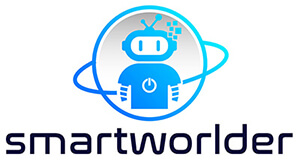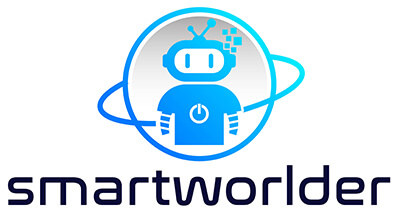Best Smart Home Devices for Independent Seniors
There will come a time when an older family member will be inflicted by the common frailties of age such as reduced vision, hearing loss, decreased mobility, and increased risk of falls.
If a retirement home or some sort of care facility is not an option for your family, you will need to set up a support system that not only includes your family and caregivers, but also a residence that has been outfitted as a smart home to accommodate your older relatives.
There are a number of Smart Home devices that can help you care for seniors as they live independently and that make their daily activities safer, more comfortable, more independent, and more social.
Home Security
A security system isn’t just about alerting you to break-ins. Systems can include sensors that alert you to doors or windows that have been left open or smoke detectors that alert you when something is burning in the kitchen. Motion-activated cameras notify you when a caretaker or visitor is coming and going.
State-of-the-art smart home systems also offer a variety of add-ons, including motion sensors, water leak sensors, smart locks and camera doorbells, key fobs, glass-break sensors, and panic buttons, all of which can be accessed via a single app.
Security Systems – By using indoor and outdoor cameras, motion sensors, and smoke and carbon monoxide detectors, residents can automatically monitor their homes when they are away or for instance at night when they are at sleep. Smart motion sensors are also able to identify the difference between residents, visitors, pets and burglars, and ring alarms, and even can notify authorities if suspicious behavior is detected.
Example: Ring Alarm Home Security System
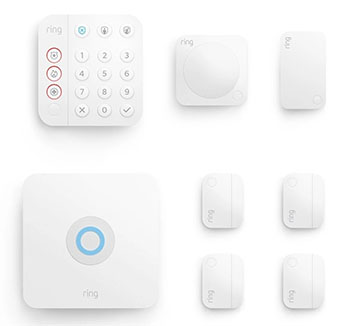
The Ring Alarm system comes in various configuration packages that make it easy and affordable to build a whole-house security system slowly. The starter kit, for instance, comes with a base station, which connects the included keypad, door/window sensor, motion detector, and one range extender.
To this starter kit you can then add accessories such as more sensors and keypads, a bedside panic button, or a doorbell camera.
A very useful feature of the Ring Alarm system is that it offers two modes: self-monitoring and professional monitoring. The subscription-based professional monitoring plan assures you that whenever the alarm is triggered, an actual person will reach out to the designated contact in addition to sending a smartphone alert. If there’s an emergency or the monitoring service is unable to contact anyone, they will alert emergency services.
Essential Smart Home Devices for Independent Senior Living
Smoke and Gas Detectors – Smoke alarms like the Google Nest Protect respond quickly and reliably to actual danger. Once it detects smoke or carbon monoxide, it triggers a loud voice alert to let you know which room the danger is in and that it will trigger its siren shortly, which is a great feature as it lets someone nearby pause the alarm before the siren goes off. It also sends smartphone alerts, which you can set up to go to family, friends, neighbors, and caregivers (as long as they have the Google Home app).
The device also has a self-testing feature, which regularly confirms that all is in working order. A convenient feature is the integrated, motion-activated night-light.
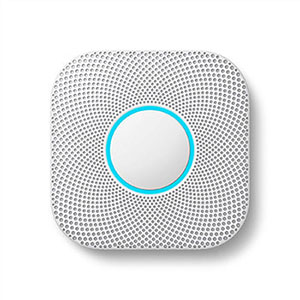
Smart Emergency Contact System – Having a way to contact emergency services is an absolute must for senior living. Emergency contact systems come in two forms: wearable electronic devices like smart watches that provide on-call monitoring and may include fall alerts; and stationary smart speakers with a virtual assistant and emergency alert features.
Smart speakers equipped with digital voice assistants such as Siri and Alexa are now the fastest-growing consumer technology since the smartphone. These smart home speakers can perform menial tasks upon activation, which is a great help for vision impaired residents or with mobility issues. For example, they can be tasked with search inquiries on the internet, dial phone numbers, make video connections with friends and family, or be used as reminders for medications.
They can also help you out during an emergency. At the moment, the only smart speakers that can call 911 are the Apple HomePod and Google Nest. Amazon’s Echo, due to regulatory compliance, can’t. Some smart speakers can be programmed to send alerts to friends and family through various apps, while others can call non-emergency numbers when you or someone else needs help.
The Alexa voice-control platform, which powers the Echo smart speaker series, is featuring the Alexa Care Hub, a free collection of services for checking in on loved ones (at the moment only available in the U.S.). A new emergency calling feature means you no longer have to call out a name; just say “Alexa, call for help,” and Alexa devices will call a designated emergency contact, as well as send a text and smartphone notification (via the Alexa app) to that person.
Another recently introduced feature is the Activity Feed, which allows you to keep tabs on your loved one's activity. For instance, it will show when they turn on smart lights, play music, or if a connected camera sees them moving about the house or when they ask about the weather. In addition to monitoring the activity feed, you can set up alerts to get notified about activity or if no activity has been detected after a specified amount of time.
Aside from the emergency help features, any Echo smart speaker – as well as other manufacturer’s smart speakers – is great for playing music, listening to news and weather reports, playing trivia games, and calling friends.
Generally, smart speaker can act as a home’s smart hub to control most of the other devices mentioned here, making them accessible via voice commands.
Smart Door Lock – They can either be independent units that replace your existing lock or, like the Wyze Lock, are designed to work with an existing deadbolt. Adding it enables you to lock and unlock the door remotely and to auto-lock the door after it's closed. The Wyze Lock also sends notifications when the door has been left open.
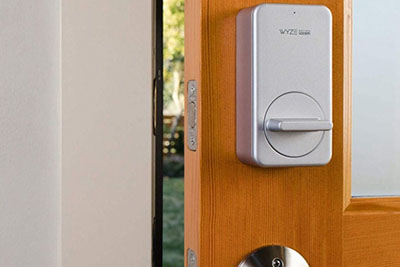
Water Leak Detector – A smart water-leak sensor like the D-Link Water Sensor can lessen the impact of plumbing problems by alerting you the moment they’re detected. You install these sensors in areas where potential leaks may happen - by the water heater, the tub, sink, or toilet. Some leak detectors also feature temperature and humidity sensors. They notify you with either an audible alarm or a smartphone notification (or both).
Door and Window Contact Sensors – You can attach these small devices to any door and window, and they alert you when they have been opened, are safely shut, or have been left open for too long. Many smart contact sensors are tied into security systems or specific platforms (such as Alexa, HomeKit, and SmartThings). All of them can integrate with other smart devices so that opening a door can trigger a light, a voice announcement, or even a call to the police.
Motion Sensors – Systems like the Hive Motion Sensor check if there is (or is not) motion at home and sends notifications the moment anything happens. Connect it with other Hive devices for even smarter control of your home. Like turning on a hall light when someone walks past.
Indoor and Outdoor Cameras – Given all the privacy issues involved, installing security cameras inside and outside a private homeneeds to be a decision made between you and your family member. Although indoor cameras can offer peace of mind by allowing you to remotely monitor home visits, movement, and whether someone is taking their medicine, quite a few people will see it as a violation of privacy, and others may find it outright frightening.
Climate Control – Smart thermostats allow you to control your home heating and air conditioning systems by voice or with an app. Smart climate control system can also learn residents’ behavior patterns and automatically modify settings to adjust ambient temperatures for various rooms. Smart thermostats can also report energy usage and remind users to change filters, among other things.
For instance, smart room thermostats connected can constantly check the humidity in your living space and let you know when it’s time to ventilate, via a push message on your smartphone. Or you can go one step further: there are windows that can open on their own via a motor, triggered by your smart room thermostat. To prevent unnecessary heat loss, the smart heating system automatically turns down the connected thermostats when windows are open.
Example: Google Nest Learning Thermostat
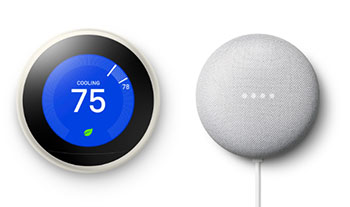
Lighting – Smart lighting systems are available for indoors and outdoor use. Smart lighting adds automation, remote control, and other convenience features. Upgrading your lights to smart lights is one of the easiest and most practical smart-home changes you can make in your residence. In addition to being able to be controlled remotely and customized, smart lighting systems detect when occupants are in the room and adjust lighting as needed. Smart lightbulbs can also regulate themselves based on daylight availability.
Example: Philips Hue Smart Light
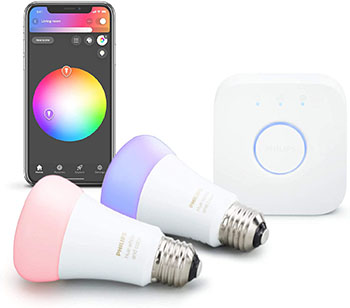
Smart Pill Dispensers – Adhering to medication treatment can be a lifesaver, whether for a chronic condition or an acute illness. However, even with the best of intentions, it can be challenging for patients and caregivers who often manage multiple medications with different dosing schedules and instructions. And of course, there is the question almost everyone has asked themselves: “Did I already take that pill today?”
For instance, the Black & Decker Pria is a personal medication assistant that takes the hassle out of medication management and relieves worries about medication non-adherence. It has visual, audio and phone alerts, and you will be notified if a dosage has been missed. Caregivers can also check in through two-way video calling or through the drop in feature. Your care circle can also receive notifications/alerts for missed scheduled doses. This system requires a monthly subscription.
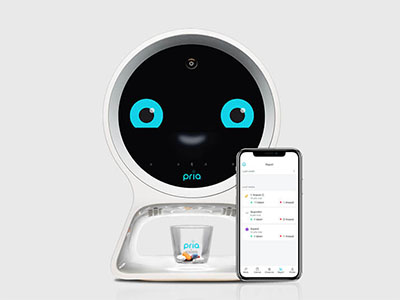
Wearable Fitness Trackers – Independent seniors, also require physical stimulation to ensure that they won't give in to a sedentary lifestyle. It doesn’t have to be an expensive smartwatch, there are numerous fitness trackers on the market like a smartwatch. There are a lot of smartwatches in the market, but here are the best ones with solid feedbacks: Samsung Gear Fit2 Pro fitness band, Amazfit Band 5 fitness tracker, and the various Fitbit health trackers.
Smart Cleaning Devices – Independent senior living can yield a lot of challenges, including maintaining a clean, organized home. Your loved ones may experience difficulties cleaning up the place, especially if they facing mobility issues. To avoid stress and exhaustion, there are smart gadgets with Bluetooth or Wi-Fi connectivity that can help in cleaning the home: Robotic vacuum cleaners are one of the best additions to your elderly's home. Just set up the smart vacuum schedule through a phone application and watch as it goes about cleaning your floors.
Check out our SmartWorlder section to read more about smart technologies.

